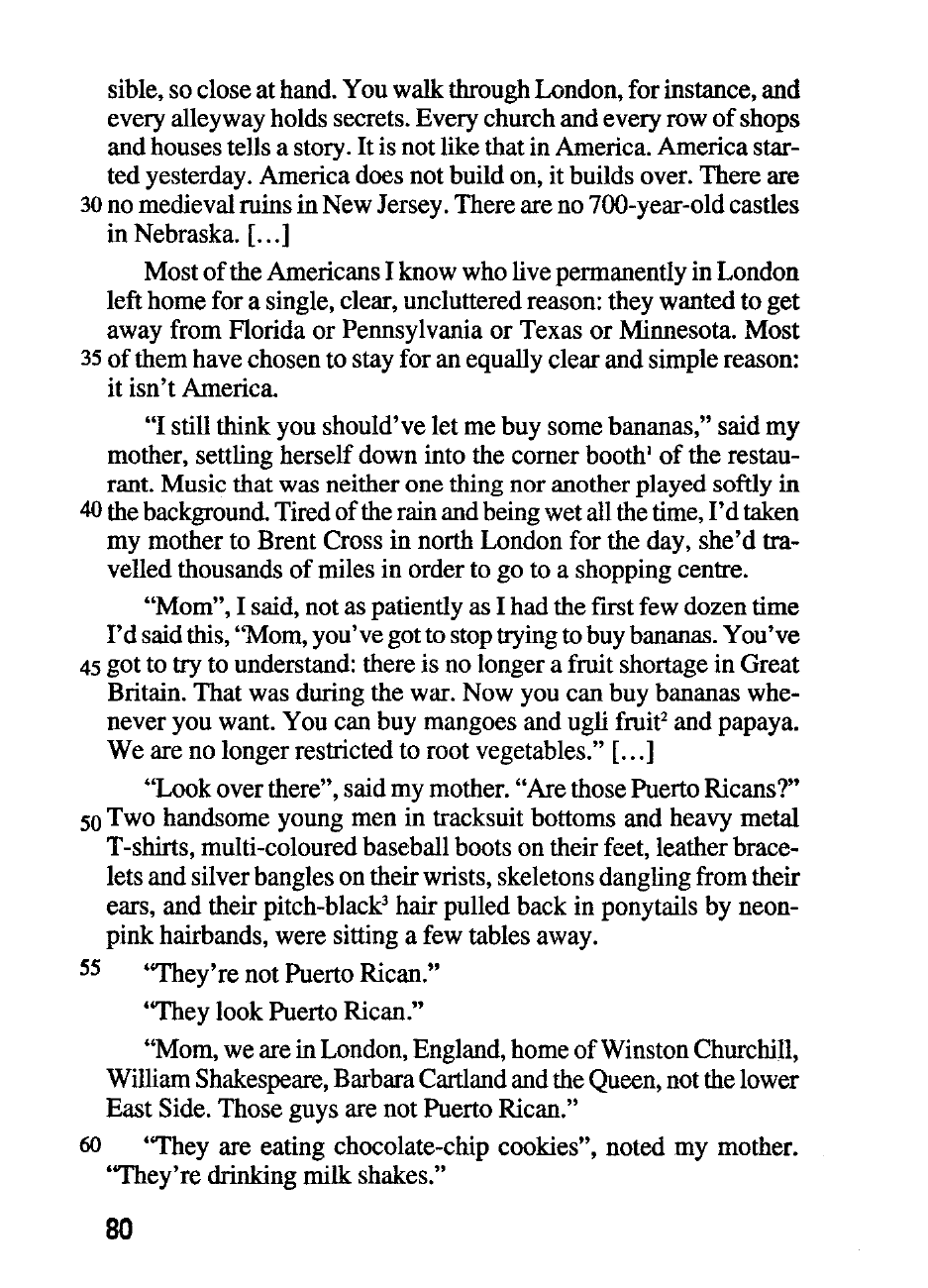ÉTRANGER — GROUPE 2, SESSION DE JUIN 1995 LANGUE VIVANTE 1- SÉRIE L
Publié le 09/08/2014

Extrait du document

1. Compréhension de l'écrit
Lire attentivement le texte ci-dessous puis répondre aux ques¬tions.
A woman's eye view of Britain today
"But they don't have cars like we do, do they?" said my mo-ther, her voice echoing on the phone.
I said, "What are you talking about, Mom, of course the British have cars. Haven't you heard of Rolls Royce?"
5 "And what about the toilets?" she wanted to know. "Mrs Lovell
at the church said they've still got out-houses, even in the city."
"Mom, Mrs Lovell at the church was in England during the War for Pete's sake. She spent most of the time in a tube station."
"What about food?" asked my mother, "should I bring some with 10 me? Mrs Lovell says it's hard to get fresh fruit."
"Mom, you're coming to London, not trekking through Katmandu."
Americans corne to Britain because it is still, for many of us, the motherland. Britain gave us our language; many of our ideas of
15 government, human rights and sex; many of our ideas of literature and culture; our founding fathers and our first presidents; and mer-cifully few of our ideas on cooking. Americans corne to Britain be-cause their grandparents came from Glasgow, or their great-grand-parents were starved out of Ireland, or their rnother's mother was
bom in Chiswick. They corne here because they recognise place
20
names and can read the menus. Because everything is both foreign and familiar.
Americans love England because it is so quaint and charming; so old. Coming from a country where anything older than 100 years 25 is ancient, they can't get over the fact that Britain's past is so visible, so close at hand. You walk through London, for instance, and every alleyway holds secrets. Every church and every row of shops and houses tells a story. It is not like that in America. America star-ted yesterday. America does not build on, it builds over. There are
30 no medieval reins in New Jersey. There are no 700-year-old castles in Nebraska. [...]
Most of the Americans I know who live permanently in London left home for a single, clear, uncluttered reason: they wanted to get away from Florida or Pennsylvania or Texas or Minnesota. Most
35 of them have chosen to stay for an equally clear and simple reason: it isn't America.
"I still think you should've let me buy some bananas," said my mother, settling herself down into the corner booth' of the restau¬rant. Music that was neither one thing nor another played softly in
40 the background. Tired of the rain and being wet all the time, I'd taken my mother to Brent Cross in north London for the day, she'd tra-velled thousands of miles in order to go to a shopping centre.
"Mom", I said, not as patiently as I had the first few dozen time I'd said this, "Mom, you' ve got to stop trying to buy bananas. You've
45 got to try to understand: there is no longera fruit shortage in Great Britain. That was during the war. Now you can buy bananas whe-never you want. You can buy mangoes and ugli fruit' and papaya. We are no longer restricted to root vegetables." [...]
"Look over there", said my mother. "Are those Puerto Ricans?"
50 Two handsome young men in tracksuit bottoms and heavy metal T-shirts, multi-coloured baseball boots on their feet, leather brace¬lets and silver bangles on their wrists, skeletons dangling from their cars, and their pitch-black' hair pulled back in ponytails by neon-pink hairbands, were sitting a few tables away.
55 "They're not Puerto Rican."
"They look Puerto Rican."
"Mom, we are in London, England, home of Winston Churchill, William Shakespeare, Barbara Cartland and the Queen, not the lower East Side. Those guys are not Puerto Rican."
60 "They are eating chocolate-chip cookies", noted my mother. "They're drinking milk shakes."
80
"Give me a break, will you Mom? You eat pizza and you're not Italian."
"That' s not the same thing, and you know it." My mother shook 65 her head again, ahnost sadly. "I don't know", said my mother. England is not exactly like I pictured it."
"Britain", I corrected.
This extract taken from Dyan SHELDON: Storia 5: A Woman's Eye View of Britain Today, Pandora Press, 1990 was published in Good Housekeeping, a women's magazine, in March 1991
1. Corner booth: banquette d'angle (1. 38)
2. Ugli fruit: tangelos, hybrides de pamplemousse et de mandarine (1. 47)
3. Pitch: la poix (mélange de résine et de goudron) (1. 53)
A. Tick the appropriate column.
Justify your decision in your own words.
True False
1. Mrs Lovell is Dyan Sheldon's mother.
2. Mrs Lovell has never been to England.
3. Most Americans enjoy British cooking.
4. The author, Dyan Sheldon is now in Britain.
5. She took her mother to a shopping centre.
6. Her mother thought bananas were hard to fmd
in London.
7. The two young men sitting not far from them
caught the mother's eye.
8. To Dyan Sheldon's mother, England and Britain are one and the same.

«
sible, so close at hand.
Y ou walk through London, for instance, and
every alleyway holds secrets.
Every church and every row
of shops
and houses tells a story.
It is not like that in America.
America star
ted yesterday.
America does not build on, it builds over.
There are
30 no medieval ruins in New Jersey.
There are no 700-year-old castles
in Nebraska.[ ...
]
Most
of the Americans 1 know who live permanently in London
left home for a single, clear, uncluttered reason: they wanted to get
away from Florida
or Pennsylvania or Texas or Minnesota.
Most
35 of them have chosen to stay for an equally clear and simple reason:
it
isn't America.
"I still think you should've let me buy some bananas," said my
mother, settling herself down into the corner booth' of the restau
rant.
Music that was neither one thing nor another played softly
in
40 the background.
Tired of the rain and being wet all the time, I' d taken
my mother to Brent Cross
in north London for the day, she'd tra
velled thousands of miles in order to go to a shopping centre.
"Mom", 1 said, notas patiently as 1 had the first few dozen time
I' d said this, "Mom, you 've gotto stop trying to buy bananas.
Y ou 've
45 got to try to understand: there is no longer a fruit shortage in Great
Britain.
That was during the war.
Now you can buy bananas whe
never you want.
Y ou can buy mangoes and ugli fruit
2 and papaya.
We are no longer restricted to root vegetables." [ ...
]
"Look over there", said my mother.
"Are those Puerto Ricans?"
50 Two handsome young men in tracksuit bottoms and heavy metal
T-shirts, multi-coloured baseball boots on their feet, leather brace
lets and sil ver bangles on their wrists, skeletons dangling from their
ears, and their pitch-black
3 hair pulled back in ponytails by neon
pink hairbands, were sitting a few tables away.
55 ''They're not Puerto Rican."
''They look Puerto Rican."
"Mom,
we are in London, England, home of Winston Churchill,
William Shakespeare, Barbara Cartland and the Queen, not the lower
East Side.
Those guys are not Puerto
Rican."
60 ''They are eating chocolate-chip cookies", noted my mother.
''They're drinking milkshakes."
80.
»
↓↓↓ APERÇU DU DOCUMENT ↓↓↓
Liens utiles
- ÉTRANGER — GROUPE 1, SESSION DE JUIN 1995 LANGUE VIVANTE 2 - SÉRIE L
- ÉTRANGER-GROUPE 2*, SESSION DE JUIN 1995 LANGUE VIVANTE I
- ÉTRANGER — GROUPE 1, SESSION DE JUIN 1995 LANGUE VIVANTE 1- SÉRIES L ET ES/S
- ÉTRANGER-GROUPE 1, SESSION DE JUIN 1995 LANGUE VIVANTE I
- SUJET NATIONAL, SESSION DE JUIN 1995 LANGUE VIVANTE 2 - SÉRIE L






